Photography has entered a whole new world, with remarkable changes in technology in just a few short years. One thing has not changed, however; the camera—not the computer—is still a good photographer’s most important tool.
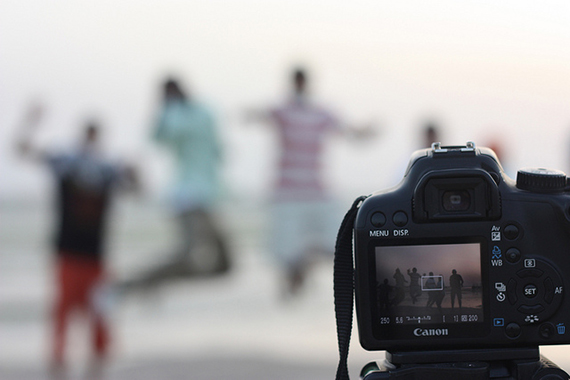
photo by Nasser ..
In recent times I have spoken to a few very disgruntled beginners, who had signed up and paid good money to attend a course in ‘digital photography.’ On arrival at the first class, they were told to put their cameras away—they would not be needing them. This was not actually a course in photography; it was a course in photo editing. So instead of being taught how to take better photos, they were being taught how to fix up their mistakes.
I would have asked for my money back, for this course was not delivering what it promised.
Was this a case of blatant false advertising? From the customer’s point of view, it certainly was. But believe it or not, the teacher may not have seen it that way. It is an alarming truth that some people see software, not the camera, as the cornerstone of photography.
When the digital photography revolution began, it excited two groups of people. First there were the traditional photographers, who embraced the cost savings and convenience offered by digital photography. For them, it was a chance to do what they had always done, but to do it in a format more suited to the modern age.
Then there were the computer types, who perhaps didn’t know much about photography and weren’t very good at it. For these people, photography had entered their world in a big way. They may not have known much about art or technology, but they sure knew plenty about software. In this world, they were way ahead of traditional photographers who had grown up with SLR cameras, film, and the darkroom.
So, does being good with software make you a good photographer? Of course not.
With software, you can achieve amazing things. You can do everything from tweaking the contrast in an image to moving objects around and making your photo look like it was a painting. But there are also plenty of things, essential things, that you can’t do. You can’t make an out-of-focus subject in focus. You can’t un-blur a moving subject that was blurred because the photographer used the wrong shutter speed.
Technical issues aside, there is also the great sense of honest satisfaction a photographer feels when they are able to capture a perfect image ‘in camera.’
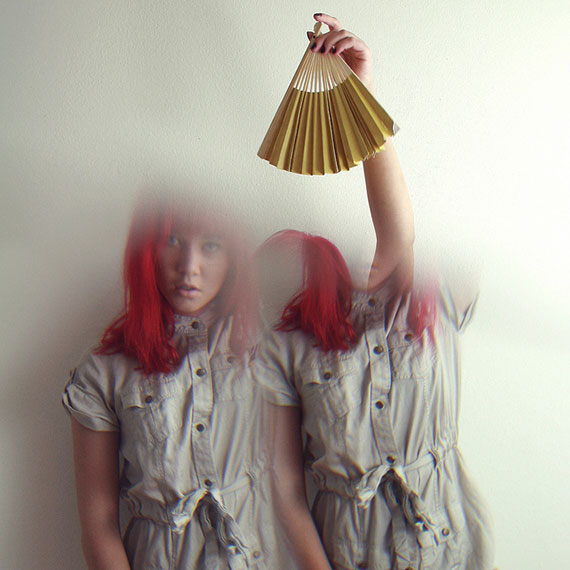
photo by Hillary Boles
I met a man who told me about his visit to Sea World. He took a bunch of photos of his wife, but he wasn’t happy with them because the skies were grey and there were lots of tourists around. So he set to work on a computer, and over three days he transformed the sky in every photo to blue and removed all those pesky tourists. He had successfully manufactured a “memory” of a day that never actually happened.
To each his own, I guess. To me it was just creepy.
In some industries, like advertising, the only thing that matters is the image; how you do it is irrelevant, as long as you produce the result. But for the average Joe, photography is about capturing memories to revisit and share with others.
I am not suggesting software has no place in photography. In fact, even devoted digital fans recognize that most images need a little tweaking of saturation and contrast to bring them up to print quality.
The point is, software is no substitute for camera skills. It is great, perhaps even essential, to know how to work on a photo after the event. But that cannot take the place of learning how to use a camera, how to appreciate light, and how to compose a great image.
Beginners beware; there are people out there who will hold you back by telling you that notions of aperture, shutter speed, and ISO are outdated relics of film photography. In fact, by learning these photography essentials, you will develop skills that will reduce your reliance on computers to fix your mistakes.
The benefits? Well, first there is the satisfaction of knowing your picture was captured with your own skill and is a true reflection of the moment as it happened.
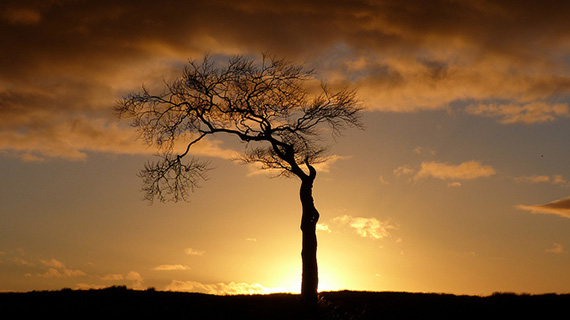
photo by Andrew
Need something more practical? Think about this. Producing a good image from a poorly taken photo can take hours sitting in front of a computer. How long does it take to get it right in the first place? About 1/500 of a second.
About the Author:
Andrew Goodall writes for https://naturesimage.com.au/ and is a nature photographer based in Australia. He manages a gallery in Montville full of landscape photography from throughout Australia.
Like This Article?
Don't Miss The Next One!
Join over 100,000 photographers of all experience levels who receive our free photography tips and articles to stay current:

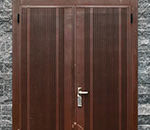

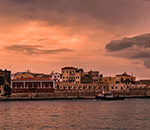
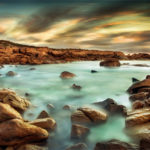
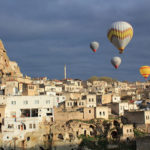
Sorry, but in the first paragraph it was stated: cameras did not change.? Only the computer?
So that computer chip inside cameras didn’t change?
Wow!
My piece: cameras have chaged, and for the better.
Like any equipment, the user need to adjust nescessary settings before using.
AND if it so happened one forgets adjusting anything, and it turned out it needs to. Yhen turn on your computer and adjust it there. Since you cannot re-create tthe shoot most of the time.
Thanks for the great article
We are Using Mark 3 Camera For Wedding Photographic Shoot. I have been working as a Wedding Photographer With Kerala Wedding Planners Kochi for a Long time. We’ve been using Editing Software for Color Correction. We Love the Way of Narration
I am Photographer and I very much liked this one
Really nice pictures. I love all those pictures.
Really nice pictures. I love all those pictures.
Yes I m completely agreeing with your point. Now days everyone having dslr cameras. But skilled and well trained photographers are identified by their quality photos. The techniques are important.
Unfortunately I am not knowledgeable to the extent many others are when it comes to photo editing…what and advantage it is..to be good at editing…you can change the color of the sky ….so many things that I cannot not do for a lack of knowledge…that means I must absolutely take a good photo the first time or other photos will look better than mine…the better looking photo sells…software editing or nor…I sometimes lighten or darken my photos or crop a little but that is it…I do use a filter on my lenses to hopefully make the sky bluer but not a lot ….I use to study the photos of other photographers and why they looked so much better than mine…SOFTWARE was doing it so many times and I wouldn’t hardly know where to begin to the degree I have seen….
Very good article and also important to point out what photography is all about.
I’m a in Belgium and in Italy based photographer for almost 40 years working on only my own projects. I flow from the analog to the digital era, I flow from the darkroom to the sophisticated computer and softwares. I have noticed that besides the only fact of workflow, digital photography has not changed and even not influenced photography at all. The change is how we perceive image but not on the creation of an image. Photography is all about and resumed in that moment, often very short instant, before releasing the shutter. In that short moment light, exposure, composition and narrative has to come together. It is in this moment the complete intellectual, conceptual and visionary world of the photographer is expressed. A good photograph is telling a story and needs a strong narrative and for this the photographer need to have large skills to transform each vision into a readable photograph. As a child I was impressed by Cartier Bresson and later I realised that all pictures that I saw were rather small prints, a 50×60 cm size was then already huge. But every picture had such a strong narrative, a story that was catching the eyes. Today technology is able to create such large sizes that a building can be covered but most of the pictures are purely technical and lacking story and emotion.
I’m fully agree that post production is not making a photograph, cameras are not making photographs, those are tools to create images. Technique cannot be a goal, it is an important skill to create a photographic vision that translate the creativity into a physical image. Without a photograph made in the lens before post production has no impact at all.
.. great article. I do not say I do not edit the photos, I’m shooting in RAW … but if I can not finish it, it’s uninteresting, boring, no postproduction does it, it can be colorful, I can make magic as I want but the photo will remain boring and uninteresting
I am a newbie in this field at the age of 67. I do my best to create the photo in my camera and not photoshop. I don’t use a dslr. Can’t afford one. I use a digital camera. Point and shoot. Canon SX530HD. I am slowly learning how to use it. I must be doing ok because I have received many positive comments and even a few that can’t understand WHY I am not a professional photographer. When I look for something to photograph, I always do my best to capture something unique. Got a good one of a woodchuck smelling a flower. Thank you GOD! I try different camera angles. Up close frame. Zoom in..zoom out etc. I lay down on the ground to get photos from different perspectives. I try very hard to present what I am SEEING. I watched a video on you tube of a guy photo shopping a picture he took..Turned out great…but far from the original. Oh well. To each his own. I guess I prefer AS IS and learning to use my camera itself to create what GOD has given me to see.
Whilst I appreciate (and even agree) to a large part of Andrew Goodall’s article, I feel he is missing out one vital element of editing. Any enthusiastic photographer in the past days of film never gave their films to processing houses and settled for all of the set of prints returned to them. Everyone I knew in my camera club had an enlarger and did their own prints for exhibitions and competitions…..unless they were specifically into slide film or A/V presentation. The software named ‘Lightroom’ is purely a digital extension to the old ‘darkroom’ techniques for many photographers and I believe the so called purists who eschew digital editing are failing to produce their best work. Even a simple crop or manipulation of the contrast is editing. A photograph ‘straight out of camera’ is very rarely what a keen photographer envisaged as the final result IMO. Most experienced and enthusiastic photographers have a mental image of what they want to portray at the taking stage. Of course, that is where technical knowledge of the camera and it’s limitations plays a big part, but also where editing techniques are also considered. I believe that editing is an essential part of photography and should be considered just as importantly as capturing the image in the first place.
your article is really good and more effective. i have got the more necessary idea from this post. thank you so much for this sharing best article
Nice article. In my opinion, digital photography really changed the face of photographic world. It became more reliable.
I agree with all of this. I’m old school, I don’t agree with heavy editing and I think Photoshop has killed photography. These days, anyone can pick up a camera, take a few un thought-out shots and then sit on Photoshop and spend hours tweaking the pic until they get something nothing like the original. That is not photography to me, that is more like graphic design. There’s some talent involved in it, but it isn’t photography.
Very well said, i couldn’t agree more.
I liked all the pictures. Really awesome. Each picture has its unique identity.
I like that pictures do a great job of capturing memories. Hiring a professional photographer, seems like a fantastic way to get images that look really great. Developing skills as a photographer, I would agree is essential to the job.
I support Mallory’s opinion that Photography and Photo editing both are not same thing. But, Now a days Photo editing is very essential to focus a photo brightly and actual intention.
It’s really funny how many people say they could fix something in post. Having proper technique like you mention is really important with photography. You can make some really cool effects, but proper composition is key as well. Thanks for calling out all these photography ideas and concepts!
Photography and photo editing both are different thing. Photo editing is not possibly can become substitute for photography technique. But using photo editing it’s possible to give photography a new and great revolution. Nowadays photo editing has become very advance level and people are using this service very professionally.
I’m a photographer and designer but i don’t more knowledge about taken good capturing. I’m so happy to read this informative article. If i have good photo editing knowledge therefore this article very important and helpful for me. Thank you for wonderful sharing and i hope keep up your good work.
This is a great thought promoting article. I have been devoted to photography for just the last 5 or 6 years, I truly wish that I had started sooner. I can’t get enough knowledge regarding camera settings, how to use the camera technically and post processing. I have an engineering background, so I suppose this is why I strive to understand my camera and it works. But I also have an inspirational and creative side to my character that endeavours to look for good composition, story telling and the wow factor in my photographs. If I may put my pennies worth in as a relatively new photographer, I think it can be a bit of both. If I’m taking shots of my family, say on a day out, memories are the most important, so I shoot in JPEG and let the camera do the main processing.
If on the other hand I want to take say landscapes or macro shots, then I shoot in raw and do my processing on my computer. I always try to set my camera up correctly, because post processing will not correct out of focus or blown out images. Art has to be a part of photography in my humble opinion, because great photographs do reach the soul. If post processing does help to achieve this, well that’s OK with me.
For as long as people have been taking professional photographs, the difference between the snapshot and the portrait has been the combination of good photo techniques, a solid understanding of photographic principals, good equipment which includes knowing how and why to use it, and good post production to enhance the image. This has been true and good for Adams, as much as for Leibovitz, or for that matter McNally, Peterson, or whomever you fancy as your brand of photographer’s photographer. A fine balance between these thruths is necessary to achieve more than a snapshot; but taking any of the factors to its maximum without regards to the others is a recipie for discourse and disagreement of what constitutes a photographic work of art or a image of the immagination. In either case art is achievable, but is it digital art, or photographic art? Or perhaps today, a combination of the two we might call digital photographic art?
I was post processing photos in 1955. I did a little burning & dodging in the darkroom. I “pushed” film developing to compensate for poor lighting. I varied the surface of prints. I even cropped slides. Won some contests in those days too. So, with all these experts in Photoshop, etc. these days, I don’t do so well in contests. So, I guess I could be bitter; which BTW seems like from where your editorial is coming.
I take the majority of my shots at ISO-3200 & ISO-6400. That usually requires a lot of noise reduction in post production. Should I just give up shooting in low light where my subjects usually are? Sometimes, it’s a little difficult to get wildlife into a studio where I could pose them in optimal light. It’s also difficult to control the backgrounds when shooting candid portraits of children.
Actually, as I see what is necessary in post processing, it helps me to see how I need to improve my photography skills. I do agree that for many, more concentration on photography skills would help their results more than post processing. But, let’s face it, even with all the great photography technology available today; we still can’t capture all that our eyes can see, no matter our camera wielding skills.
I find it ironic that the article about photo editing vs photo technique has a photo leading off with a huge circle of sensor dust right in the negative space at the top of the image. I think technique is the basis of all art. But at the end of the day, if you want to use your images straight out of camera do it; if you don’t then don’t.
The funny thing about this post is that the photos used in the post have more than likely been edited with software.
I think it is irrelevant at best.
The tenets of “straight” photography can be accomplished with simple adjustments of an image. Taking a sort of ‘film’ approach. This is what I shot, and I want it to be as free from manipulation as possible. Cool – that is a style that is well respected.
There are those for whom the image is but fodder for creating something beyond what was seen in the camera and caught on the sensor.
Cool as well.
The examples shown are from the former, and that makes sense. What doesn’t work is the notion that somehow there is a right, a correct way, to produce a finished image.
That is beyond silly.
Surely capturing ‘the’ moment is worth more than creating ‘a’ moment.
In my opinion photography is about patience, vision and creativity.
Of course, editing has a huge role to play in the photography world but, natural photography cannot be compared to that of an edited image.
Why do I need to buy a very expensive camera and lenses if I’m going to edit my photos after the shots? it’s useless… it’s better to use an ordinary digital camera or cellphones if you are always not satisfied on results and keep editing the photographs. cheers!!
I say perfect the shoot and perfect the necessary post processing for an image or a photograph. This is a free world so if you want to concentrate on photo capture techniques only, it is your prerogative. Let us not discourage those who would want to expand their abilities beyond the camera as digital photography has become a rather wide field sometimes only limited by our imagination and creativity.
In this field, as in most fields, it is best to keep an open mind. This world is full of biased minds and I admit to being guilty at certain stages of my quest to gain more knowledge and experience and eventually be self corrected.
I was watching television the other day and saw one of the most disappointing camera commercials i think there could possibly be. There was a man showing his work in front of an audience and they asked him what the shutter speed was, his response was “I don’t know, fast?” they then asked what the aperature was, he showed a circle with his hands and again, shrugged it off. The ad finished with the quote “you don’t need to be an amazing photographer to take amazing photos”
I think it is absolutely ridiculous to put these notions in peoples heads who are inexperienced just to get them to buy their product, Im not arguing that you need to be an amazing photographer to take pictures that will wow people, but they are basically telling people that they don’t need to learn anything about their equipment or how it works.
Post processing works in the same way, instead of learning to use your equipment to take the best possible photographs under different situations, you can just drop a photo into lightroom, hit a button and get an extremely vivid and eyecatching picture. Ignorance is not an excuse for not learning to use the equipment that you more than likely spent hundreds, or even thousands of dollars on.
@eeryweerywoe I don’t know about that “worth more” comment. Ansel Adams went pretty far with post exposure creation. He addressed our community photo group once, and talked directly about getting that ‘moment’ via pre & post exposure. He was visibly irritated by questions about f stops & shutter speeds, not so for place & time. Ron Stanford created striking wildlife images with “slide sandwiches” which process, I believe, would qualify as the ultimate in out of camera creativity. To be sure, I heard Galen Rowell comment about the hardships he endured to capture his “Alpen light” photos, at just the right moment, along the mountain peaks. So in the end, my personal bias is, the finished image completes the paradigm between photographer & audience. Maybe it’s nobody’s business, but the artist’s own, how he produces his art; the image either stands or falls on it’s perceived merit , by it’s target audience.
I couldn’t agree more. I believe it very important to learn your camera and any other tool you choice to use. At times it’s important to capture a moment truthfully and others times not. I say learn your tools, be creative, be passionate, make art and don’t worry about coloring within the lines.
“The negative is the equivalent of the composer’s score, and the print the performance.” Ansel Adams
Good article. Especially when I have a class coming Sunday and wanting to spread the love of photography and yet do not want them to be so dependent on post processing.
Fact of photography since its invention: Post processing is part of photography.
But why are we so into “out of camera” versus “post processing” arguments?
The answer is deceptively simple. Those who are proponents of “out of camera” photography are those who simply treasure the things that they learn. Skills learnt makes you a better person. I think if we are sincere to really want to embrace photography, then the first step is to really understand photography through the usage of the basic tools of photography: Aperture and Shutter speed.
I would say those who are really into photography, will appreciate the type of discussions that actually builds you up as a photographer in terms of the knowledge and application of the technical skills.
In contrast to a discussion of photoshop steps to enhance a photograph, the skills learnt is meant to enhance you as a digital imager, hence lays the difference.
Ultimately, it all boils down to who you really want to become when it comes to an image: Do you want to be a photographer or a digital imager? If it is the former, I welcome you to a world of photography that photoshop won’t provide that easily because of the sacrifices one has to make to capture that one shot of a bald eagle staring into you, that one exposure of that gorgeous sunset (with an accompanying crescent moon) and that one picture that cause you to remember that significant time of your life.
If you want to be an imager, then the art world is your oyster since it has gone beyond the restrictions of photography as an archival medium. But I would not call that photography in its purest sense of the word.
To me, I want to remember what actually has happened; I want to remember what I took is what I really saw; I want to remember the truth of a matter, not a figment of imagination of what I would want.
Hence, what I want has led me to become a photographer; to use post processing as a way to correct minor embellishment but not to hijack my memory of a place, of a person and of an event in life.
Nice post. I do agree that the best photos are those that don’t require setups, light controls, blemish removals and severe body changes. Beauty is truly in the eye of the beholder, but the best photos are the ones that “just happen,” when the photographer is in the right place at the right time.
I don’t think, I resent editing as deeply, as the author. I do dislike “rendering” when over done. I see software as a useful tool, that can make art from “illustrations” & compensate for cheap equipment. The horrible truth is, the great photographs have mostly been taken by now. I suggest the rest of us, work with variations on a theme. It’s the same criticism Norman Rockwell’s work goes through; a great “illustrator”, striking universal and generally accepted themes, but is it “art”? Art should soar and stimulate to escape the act of “recording” a moment. That is when the photograph, begins to live beyond the archival.
Part of the definition of art, has to be the quality of one’s self, that the artist is able to put into the creation, and to what degree the viewer incorporates, their personal experience, into the image . A good photograph should work as a shared vision, IMHO. A recent art discussion, suggested that once you “get ” (comprehend) a work, it is time to sell. I think that’s easily true of illustrations, and may be of repetitive efforts in art. In that sense, editing tools are a Pandora’s Box for expression. One thing I certainly agree with, is that, if the image is not there to begin with, all the editing in the world can’t save it.
word
I could not have written it any better! I concur that “getting it right the first time” is important. Spending time afterwards “fixing” my photos to look like something I COULD have photographed with my DSLR is really time consuming. Also, I would also have been VERY disappointed to find out that the digital class I may have signed up & paid for was going to help me learn how to better shoot photos. Thank you for a great article!
Ironic that you write about this immediately after the post about how to do HDR, which is one of the most over abused post processing techniques I’ve ever witnessed.
Rob-L, I agree that the HDR is one of the “most over abused post processing techniques. . . .” I would use it to enhance my photos (if I wanted or needed to, of course). I would like to see less use of it. Some photos look so “over-done” that it makes me want to cry, so-to-speak, after I see what the original shot. Good shooting!
Sorry Rob-L, I meant to write “. . . after I see the original shot.” or photo.
Yes, the photo right out of the camera is the most important thing. However editing the photo after capture is nothing new. Even Ansel Adams edited his photos. Modern software is a tool that replaces the Darkroom of the past.
I am a true believer that one is better off to spend more time behind the lens than in front of a computer screen. I shoot commercially and just today I was working on a product shoot for a client. The client was there with me and they pointed something out that I could “fix in post”, instead, and much to the clients surprise, I said I would rather take the time to correct the mistake in camera to cut down on editing time. Photographers don’t just take pretty pictures, we also need to be great problem solvers. Spend more time behind the camera and your skill will grow, spend more time in front of a monitor and you will forever miss the best shots.